|
|
|
Sort Order |
|
|
|
Items / Page
|
|
|
|
|
|
|
| Srl | Item |
| 1 |
ID:
121620
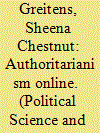

|
|
|
|
|
| Publication |
2013.
|
| Summary/Abstract |
What kind of Internet data is generated in authoritarian political environments? And how can political scientists use that data to better understand the dynamics of nondemocratic regimes?
|
|
|
|
|
|
|
|
|
|
|
|
|
|
|
|
| 2 |
ID:
121614
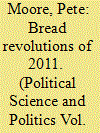

|
|
|
|
|
| Publication |
2013.
|
| Summary/Abstract |
Whether it was bread-wielding Tunisians, marching Suez workers, or Yemeni protestors chanting against corruption, the 2011 Arab uprisings put political economy issues front and center. Indeed, a critical thread throughout the region's uprisings has been the simple question: "where has the money gone?" And though the field of political economy is multifaceted, the basic refrain "follow the money" unites most of it. Having students engage and debate political economy issues helps counteract much of the popular media's fixation on violence, terrorism, and sectarianism that too often exclusively frames how Americans understand the Middle East. Political economy gets at some of the most important (but certainly not all) factors and dynamics that define social and political life in the Middle East. A political economy approach also reinforces the critical disposition and tools of inquiry to instill in university undergraduates. In particular, the approach stresses to students that the realms of the economy and the political are hardly distinct, and therefore a more complete explanation for the events of 2011, and after, require grasping that interaction (Lindblom 1982; Polanyi 2001).
|
|
|
|
|
|
|
|
|
|
|
|
|
|
|
|
| 3 |
ID:
121634
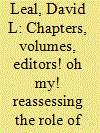

|
|
|
|
|
| Publication |
2013.
|
| Summary/Abstract |
Many scholars discount the value of edited volumes and book chapters to the social science enterprise. Nevertheless, these unique formats advance scholarship, help faculty and graduate students achieve their goals, and enhance teaching and learning. This article therefore assesses the criticisms of volumes and chapters, reconsiders the contributions of these publications, and makes recommendations for improving their accessibility and status.
|
|
|
|
|
|
|
|
|
|
|
|
|
|
|
|
| 4 |
ID:
121635
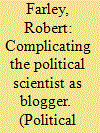

|
|
|
|
|
| Publication |
2013.
|
| Summary/Abstract |
In our efforts to make blogging an acceptable component of an academic career in political science, we ought not tame the practice of blogging beyond recognition. Multiple models exist under which blogging can contribute to the discipline of political science and through which political scientists can contribute to the public sphere.
|
|
|
|
|
|
|
|
|
|
|
|
|
|
|
|
| 5 |
ID:
121612
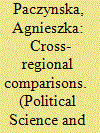

|
|
|
|
|
| Publication |
2013.
|
| Summary/Abstract |
The Arab uprisings, like the fall of the Berlin Wall more than two decades ago, are watershed events that have raised fundamental questions about our understanding of the processes of political change, the emergence and diffusion of contentious collective action, and the role of the international context in facilitating or hindering political change. The uprisings have further strengthened a growing focus within Middle Eastern studies on framing questions about the social, economic, and political dynamics in the region in ways that allow for more robust linkages with comparative theorizing about the dynamics of contentious collective action and the processes of political change. In other words, the Arab uprisings have injected new energy into the comparative study of contentious politics. In addition to new research agendas the uprisings have also provided opportunities for introducing students in survey and theory courses to the region's political dynamics, enriching students' engagement with theoretical concepts and honing their critical thinking and analytical skills while making the Middle East less "exceptional" for the students. Here, I focus on how incorporating of Middle Eastern cases allows instructors to raise questions and engage students in discussions about the emergence and diffusion of contentious collective action.
|
|
|
|
|
|
|
|
|
|
|
|
|
|
|
|
| 6 |
ID:
121619
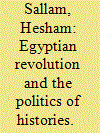

|
|
|
|
|
| Publication |
2013.
|
| Summary/Abstract |
The Arab "revolutions" and the events surrounding them have posed a variety of theoretical challenges to political scientists. Popular uprisings have resulted in the ouster of long-standing autocrats in Tunisia, Egypt, Libya, and Yemen, and are seriously threatening the survival of incumbent authoritarian rulers in a region that once seemed immune to democratic change (Brumberg 2002; Fish 2002; Heydemann 2007; Posusney and Angrist 2005; Salamé 1994; Schlumberger 2007). These unforeseen developments pushed scholars of politics back to the drawing board to revisit dominant theoretical understandings of the drivers of regime change and stability (Albrecht and Bishara 2011; Bellin 2012; Blaydes and Lo 2012; Brownlee and Stacher 2011; Droz-Vincent 2011; Gause 2011; Goldstone 2011; Hoffman and Jamal 2012, Lynch 2011; Masoud 2011; Stacher 2012).
|
|
|
|
|
|
|
|
|
|
|
|
|
|
|
|
| 7 |
ID:
121632
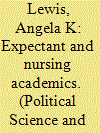

|
|
|
|
|
| Publication |
2013.
|
| Summary/Abstract |
The challenges that women in academia face are well documented. However, there is a dearth of research on the experiences of female academics particularly on job interviews as expectant or nursing mothers. This study sought to document the experiences of these women. Considering the grueling nature of the academic job interview, do expectant or nursing mothers ask for accommodations on the interview, and if so, how do departments respond to their request? We find that women refrain from job interviews as expectant mothers while others suggest using the "hidden pregnancy phenomenon." Nursing mothers had more positive experiences, although experiences were less than desirable. Based on the findings, we offer a list of recommendations to departments to help improve this critical step in starting a career in academe.
|
|
|
|
|
|
|
|
|
|
|
|
|
|
|
|
| 8 |
ID:
121637


|
|
|
|
|
| Publication |
2013.
|
| Summary/Abstract |
How can we make international relations real and meaningful for undergraduates? Because of my own frustration with this challenge, I tried a new way of teaching international relations. During the fall 2009 semester, the final exam for an upper-division course required the students to create and conduct a simulation to teach other students about international political institutions. I willingly gave up control of my classroom to the students!
|
|
|
|
|
|
|
|
|
|
|
|
|
|
|
|
| 9 |
ID:
121616
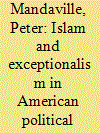

|
|
|
|
|
| Publication |
2013.
|
| Summary/Abstract |
The phenomenal success achieved by Islamic political parties in the wake of the Arab uprisings of 2011 is one of the most significant and frequently noted developments to follow from those momentous events. Within a few months of the demise of long-standing authoritarian regimes, Islamist groups that had been banned and oppressed for decades found themselves flourishing. Soon El-Nahda in Tunisia and then Egypt's Muslim Brotherhood tasted victory in constituent assembly, legislative, and eventually presidential elections. A new area of political Islam in power had seemingly arrived.
|
|
|
|
|
|
|
|
|
|
|
|
|
|
|
|
| 10 |
ID:
121630


|
|
|
|
|
| Publication |
2013.
|
| Summary/Abstract |
In studying the correlates of job satisfaction among political science faculty we confirm some findings from other disciplines, such as the relationship between institutional type and satisfaction. We demonstrate that those working in top-ranked departments or in private institutions tend to have higher levels of satisfaction with their jobs and with their contributions to the profession. Both job satisfaction and professional satisfaction tend to be highest among full professors; and greater productivity in terms of publishing is independently linked to greater levels of professional satisfaction. In contrast, comparatively higher undergraduate teaching loads undermine professional satisfaction. We also determine that men and women do not differ systematically from one another in their satisfaction levels. We do, however, document significantly lower levels of satisfaction among racial minorities in political science departments. In exploring this finding, we uncover reports of discrimination and dramatic differences in levels of collegiality experienced by different subgroups of faculty members. Experiences with discrimination undermine job satisfaction and are more frequently reported by women than men and are more common among minority faculty than nonminorities.
|
|
|
|
|
|
|
|
|
|
|
|
|
|
|
|
| 11 |
ID:
121617


|
|
|
|
|
| Publication |
2013.
|
| Summary/Abstract |
In this article I address the perennial lenses through which the region is studied and produced as a reality unto itself, particularly in the dominant discourse in the United States. I conclude with some contingent good news.
|
|
|
|
|
|
|
|
|
|
|
|
|
|
|
|
| 12 |
ID:
121638
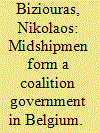

|
|
|
|
|
| Publication |
2013.
|
| Summary/Abstract |
Using a role-playing simulation on government formation with pre- and posttest assessment format, I show that students developed a significantly greater capacity for precision and specificity in their answers about the process of coalition government formation in parliamentary systems; students changed their beliefs in the ability of institutional rules to causally affect the process of coalition government formation in parliamentary systems; and, finally, students, changed their views on whether office-seeking politicians are more successful than policy-seeking politicians in forming coalition governments in parliamentary systems.
|
|
|
|
|
|
|
|
|
|
|
|
|
|
|
|
| 13 |
ID:
121633


|
|
|
|
|
| Publication |
2013.
|
| Summary/Abstract |
Graduate students seldom know how to navigate the publishing process, yet a growing expectation is that new hires are capable of immediately producing publishable research as well as teaching. Considering the current state of the job market, graduate students should plan early to take advantage of the opportunities to publish early in their graduate career. This article provides suggestions for beginning the publishing process.
|
|
|
|
|
|
|
|
|
|
|
|
|
|
|
|
| 14 |
ID:
121623
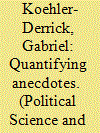

|
|
|
|
|
| Publication |
2013.
|
| Summary/Abstract |
The events of 2011 transformed the politics of the Arab world. In just under 12 months, dictators fell in three countries: Tunisia, Egypt, and Libya. In Bahrain, Yemen, and Syria, protests and violence continued throughout 2012 to shake what were once assumed to be the solid foundations of long-standing autocratic regimes. Although it is too soon to assess the outcome of these events, one immediate consequence is clear: the empowerment of public opinion in Arab politics. For the first time in more than 50 years, the voices of average Tunisians, Egyptians, and Libyans can directly influence political outcomes. This shift may yet prove to be temporary, but its importance in driving current events cannot be discounted.
|
|
|
|
|
|
|
|
|
|
|
|
|
|
|
|
| 15 |
ID:
121629
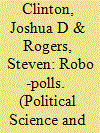

|
|
|
|
|
| Publication |
2013.
|
| Summary/Abstract |
After the 2012 Republican New Hampshire primary, 159 poll results were released prior to the subsequent nomination contests in the Republican presidential primary. More than two-thirds of these polls relied on interactive voice response (IVR) software to conduct the interviews. We evaluate the ability of polls to predict the vote-share for the Republican candidates Romney, Santorum, and Gingrich. We find no overall difference in the average accuracy of IVR and traditional human polls, but IVR polls conducted prior to human polls are significantly poorer predictors of election outcomes than traditional human polls even after controlling for characteristics of the states, polls, and electoral environment. These findings provide suggestive, but not conclusive, evidence that pollsters may take cues from one another given the stakes involved. If so, reported polls should not be assumed to be independent of one another and so-called poll-of-polls will be misleadingly precise.
|
|
|
|
|
|
|
|
|
|
|
|
|
|
|
|
| 16 |
ID:
121626
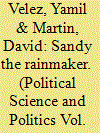

|
|
|
|
|
| Publication |
2013.
|
| Summary/Abstract |
The arrival of Hurricane Sandy within a week of the 2012 presidential election caused unprecedented disruption to the final days of the campaign and Election Day in areas that were affected. The precise impact of the storm on those areas hit hardest was not necessarily clear. Contrary to prior research on the effect of disasters on electoral outcomes, we find that the president's vote share was ultimately increased in storm-affected areas by about four percentage points, plus or minus two points. While those states most heavily affected were unlikely to give their electoral vote to Romney because of other factors, we present counterfactual analyses that show that such a storm could have had a significant impact on swing states: although the storm only affected some areas, we show that Virginia would likely have been won by Romney were it not hit at all, whereas North Carolina would likely have gone for Obama had it been directly in the storm's path.
|
|
|
|
|
|
|
|
|
|
|
|
|
|
|
|
| 17 |
ID:
121625


|
|
|
|
|
| Publication |
2013.
|
| Summary/Abstract |
Despite having transitioned to democracy, the governments of many developing countries still deliver poor public services as measured by social outcome indicators. Recent literature frames these issues of governance and public service delivery as a two-part principal-agent problem: civil servants are the agents of politicians and politicians are themselves the agents of the voters (Olken and Pande 2011). Much of this literature explores the determinants that drive citizens to demand better services (Pande 2011). Less attention, however, has been paid to understanding the behavior of the agents themselves and the interventions that can lead local politicians and civil servants to deliver better services.
|
|
|
|
|
|
|
|
|
|
|
|
|
|
|
|
| 18 |
ID:
121628
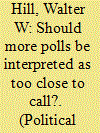

|
|
|
|
|
| Publication |
2013.
|
| Summary/Abstract |
During political campaigns the spread between the popularity of the candidates is a common metric capturing the state of the horse-race feature of the campaign. One candidate is said to be ahead of another by an indicated number of percentage points. If the difference is less than the margin of error, the race is considered too close to call. In two-person races, however, the spread corresponds to a much smaller confidence level than is usually reported because the two numbers used to compute the spread are not independent. The size of the confidence interval that is typically reported is incorrect by a factor of two. Therefore, some spreads that are reported as decisive are races too close to call.
|
|
|
|
|
|
|
|
|
|
|
|
|
|
|
|
| 19 |
ID:
121615
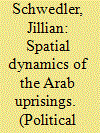

|
|
|
|
|
| Publication |
2013.
|
| Summary/Abstract |
Analyses of the spread of the Arab uprisings have been dominated by three comparative angles. Single-country studies have emerged as the most common framework, often put to use in a second comparative approach of examining variation across cases. For example, studies explore which states have had major uprisings and which have not, which uprisings were peaceful and which were violent, and so on (Amar and Prashad 2013; Haddad, Bsheer, and Abu-Rish 2012; McMurray and Ufheil-Somers 2013; Sowers and Toensing 2013). A third approach explores comparisons with other waves of popular mobilization against authoritarian regimes, for example, in Europe during the mid-nineteenth century, Eastern Europe following the collapse of the Soviet Union in 1989, and so on (Patel, Bunce, and Wolchik 2013 Weyland 2012). These literatures investigate the complex processes of mobilization, revolution, and transition unfolding in parts of the Middle East since the outbreak of the uprisings in late 2010. From the literature on revolutions, for example, we know that a popularly based movement that brings about some change in political leadership does not necessarily lead to a regime change resulting in a fundamental overturning of an economic, political, or social system. From past cases we have learned that at least some old institutions and alliances almost always reemerge, and what form the new institution will take eventually is often unknown for several years-for example, think of the Iranian revolution, let alone the French revolution. As events in postrevolutionary Tunisia, Libya, Egypt, and Yemen continue to unfold-and it is questionable whether those revolutions are even over-and as the bloody civil war in Syria continues, these insights provide us with useful tools for examining how institutions, processes, and power relations are changing-and how they are not.
|
|
|
|
|
|
|
|
|
|
|
|
|
|
|
|
| 20 |
ID:
121636


|
|
|
|
|
| Publication |
2013.
|
| Summary/Abstract |
The 2012 congressional redistricting was the first for which census data and mapmaking software were available to and easily useable by undergraduate students. We discuss our experience teaching the redistricting process to undergraduates and having our students draw constitutionally and statutorily valid congressional districts for Massachusetts. Bringing students into the process is a valuable teaching tool, and it also provides unbiased redistricting scenarios to state legislators and makes the redistricting process more open and transparent. Perhaps contrary to the fears of some legislators, our students placed substantial value on incumbency and the preservation of existing district lines, along with a respect for the traditional redistricting concerns of communities of interest and compactness.
|
|
|
|
|
|
|
|
|
|
|
|
|
|
|
|
|
|
|
|
|